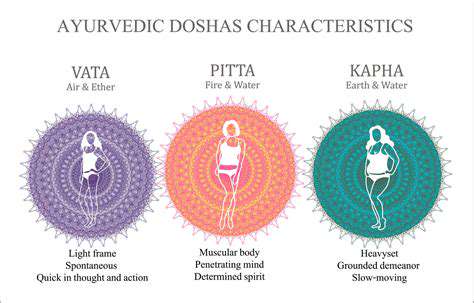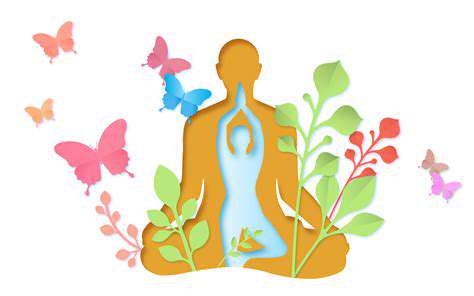Ayurvedic Principles for Daily Living

Understanding the Three Doshas
Ayurveda, India's timeless healing tradition, revolves around three core energies called doshas: Vata, Pitta, and Kapha. These aren't just bodily components but dynamic forces shaping our entire existence - from physical traits to emotional responses and cognitive functions. Grasping these concepts forms the bedrock of Ayurvedic wisdom for maintaining holistic wellness.
Every dosha embodies distinct attributes. Vata embodies motion like the wind, Pitta represents transformative fire, while Kapha provides earthy stability. Their harmonious interplay ensures wellbeing, whereas imbalance triggers health issues. Mastering these subtle interactions unlocks Ayurveda's profound potential for personalized care.
Vata: The Energy of Movement
Governed by air and space elements, Vata regulates essential motions - breath, blood flow, and neural signals. Naturally vivacious Vata-dominant individuals often display remarkable creativity and adaptability. However, they may struggle with restlessness, scattered thoughts, or anxiety when unbalanced. Grounding practices become crucial for maintaining equilibrium.
Timely recognition of Vata disturbances through telltale signs like dry skin, joint discomfort, or digestive irregularities allows for targeted interventions. Customized dietary plans, calming routines, and specialized therapies can effectively restore stability while preventing nervous system-related complications.
Pitta: The Energy of Transformation
Fiery Pitta governs metabolic processes including digestion, nutrient absorption, and temperature regulation. Pitta-predominant people typically exhibit sharp intellect and strong determination, though excessive heat may manifest as irritability or inflammatory conditions.
Balancing Pitta requires careful attention to diet, emotional regulation, and cooling practices. When properly managed, this dosha fuels mental clarity, robust digestion, and vibrant energy. Understanding Pitta's connection to emotional states enables more nuanced therapeutic approaches.
Kapha: The Energy of Stability
Combining water and earth elements, Kapha provides structural integrity, moisture balance, and immune function. Those with dominant Kapha tend to be compassionate and steady, though imbalances may lead to lethargy or weight concerns.
Effective Ayurvedic care identifies Kapha excess through characteristic symptoms. Properly balanced Kapha fosters resilient immunity and emotional equanimity. Tailored dietary adjustments, invigorating activities, and targeted treatments can restore this dosha's nourishing qualities without its potential drawbacks.
Harnessing the Power of Self-Care and Mindfulness

Prioritizing Your Well-being
Far from mere pampering, intentional self-care forms the foundation for sustainable wellness. Conscious self-nurturing builds stress resilience, enhances focus, and fosters emotional stability. It begins with honest self-assessment and crafting routines that honor your unique requirements, enabling peak performance across life's domains.
Even brief daily moments of self-renewal can profoundly impact outlook and interpersonal dynamics. This investment compounds over time, creating lasting positive change.
Identifying Your Needs
Effective self-care stems from deep self-awareness. What truly restores your energy? Which situations deplete you? Mapping your physical, emotional, and mental landscape allows creation of personalized regeneration strategies. Exploratory practices like nature immersion or reflective writing often reveal insightful patterns.
Experimental approaches often yield the most authentic insights about personal renewal needs. Documenting observations helps refine your self-care blueprint over time.
Implementing Practical Strategies
Authentic self-care defies standardization. Some thrive with vigorous exercise while others prefer contemplative practices. The key lies in consistent application of what genuinely serves you.
Small, daily acts of self-kindness create compounding benefits that transform wellbeing. Whether through nutritious meals, meaningful connections, or mindful pauses, sustainable change emerges from manageable, regular practices.
Sustaining a Healthy Routine
Establishing rhythms represents just the initial phase. Long-term success demands flexible commitment through life's fluctuations. Expect adjustment periods and occasional setbacks as natural parts of the process.
Regularly evaluating and modifying your approach ensures continued relevance. This dynamic maintenance preserves the vitality of your self-care practice through changing circumstances.
The Role of Seasonal Adjustments in Ayurvedic Living

Understanding Seasonal Variations
Ayurvedic wisdom emphasizes adapting lifestyles to nature's cyclical rhythms. Recognizing seasonal influences allows proactive harmonization with environmental changes. Just as deciduous trees adjust to seasons, our bodies require different support throughout the year.
Traditional methods identify optimal seasonal practices through careful observation. These time-tested protocols help maintain doshic equilibrium despite external fluctuations. By aligning with natural cycles, we enhance vitality and prevent seasonal imbalances.
Applications in Various Fields
Seasonal awareness extends beyond personal health into multiple domains. Farmers have long relied on seasonal knowledge for optimal planting and harvesting. Modern research increasingly validates these ancient observations.
In healthcare, seasonal patterns inform prevention strategies and treatment timing. Understanding cyclic variations helps predict and mitigate seasonal health challenges, from allergies to mood fluctuations.
Businesses similarly benefit from seasonal insights when planning operations and product offerings. This holistic perspective creates synergy between human activity and natural rhythms.
Seasonal intelligence represents a powerful tool for sustainable living. When properly applied, it enhances wellbeing, productivity, and environmental harmony throughout the annual cycle.

